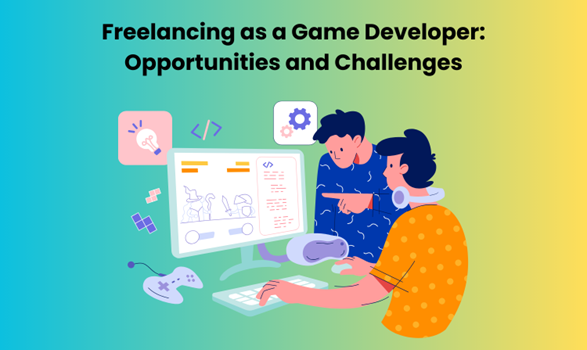Gaming industry has grown a lot in last two decades as a result there is an increased demand for Game Developers. Many studios hire freelancers for smaller projects or for smaller chunks in a bigger game. If you want to embark on this journey, you will require a blend of talent, dedication, and specialised skills acquired through Game Development Training. For those aspiring to become a Game Developer, understanding the opportunities and challenges is essential. In this blog, we will go over How to Become a Game Developer and understand the challenges involved.
Opportunities in Freelance Game Development
The independence and adaptability that come with freelancing as a Game Developer are second to none. Projects, hours, and even office space are all up for grabs for developers. Individual tastes and creative cycles may be accommodated through this liberty, which promotes a good work-life balance.
The freelance world presents many opportunities to diversify one’s portfolio. By working on projects of all sizes, types, and platforms, developers may broaden their experience and learn new skills.
Working as a freelance Game Developer enables global collaboration with diverse teams and clients. This creates a vast network, which in turn creates chances for new experiences, mentorship, and possibilities for learning.
With the industry’s booming success, freelance Game Developers often have the potential to earn lucratively, especially with successful projects or long-term partnerships.
Challenges in Freelance Game Development
There is an excess of developers competing for projects in the game development industry, making competition fierce. To stand out from the crowd, you need more than simply competence; you need to be innovative and persistent.
Because their jobs are project-based, freelancers frequently deal with unpredictable sources of revenue. It may be particularly difficult for newcomers to the industry to get steady projects and manage their money.
The capacity to adapt and diversify one’s skill set is essential since the skill sets needed to use new technologies change over time. Even after finishing formal training in game development, Freelancers must commit to continued study to upskill and adapt to shifting trends.
Freelancers need to be experts at what they do, but they also need to be able to manage their clients and communicate with them effectively. Collaborating well requires knowing what the customer needs, completing the job on time, and communicating well.
How to Become a Freelance Game Developer
Becoming a freelance Game Developer is not easy as it requires learning a lot of technical skills along with other soft skills as well. Here is a general roadmap for a freelance Game Developer.
Comprehensive Game Development Training
Get a degree or enrol in game development classes online if you’re not already doing so. You may find courses on many different areas of game development like animation, art design, level design, etc.
Focus on becoming an expert in the aspects of game creation that interest you the most, such as 2D/3D art, game design, or programming in languages like Python, C#, or JavaScript.
Build a Diverse and Impressive Portfolio
Personal Projects
Initiate and complete personal game projects. These might be simple games or demonstrations of your skills in various game development areas. Help out open-source projects by contributing to them. Contributing to ongoing projects shows that you can work well with others and build your portfolio at the same time.
Networking and Collaboration
Join Communities
Engage with game development communities like IndieDB, TIGSource, or Reddit’s gamedev subreddit. Establish rapport within the community, participate in conversations, ask for guidance, and share your thoughts.
Attend Events and Workshops
Attend industry events, game jams, and workshops either physically or virtually. You may meet other experts, prospective clients, and collaborators on these networks.
Soft Skills Refinement
Communication
Hone your ability to communicate effectively with clients, peers, and collaborators. Articulating thoughts clearly and understanding the requirements is essential in game development as it can make or break a game.
Time Management
Develop strong time management skills to meet project deadlines and balance multiple projects simultaneously.
Problem-solving Abilities
Cultivate problem-solving skills to troubleshoot technical issues and overcome obstacles during game development.
Establishing Credibility
Portfolio Website: Build a professional website showcasing your portfolio, including game demos, artwork, coding samples, and client testimonials if available.
- Share your work on social media platforms online.
- Interact with the community.
- Showcase your knowledge by using sites like GitHub, LinkedIn, and Twitter.
Marketing and Pitching
Tailored Pitches: Customize pitches for potential clients or studios. Bring attention to your one-of-a-kind abilities and relevant work history that can help them.
Upwork, Freelancer, and Fiverr are just a few examples of freelance sites where you can sign up for jobs and gain experience. Be sure to include your most recent accomplishments and abilities in your profiles.
Adaptability and Continuous Learning
Stay Updated: Game development is a rapidly evolving field. Follow industry blogs, forums, and webinars or conferences to stay up-to-date on new tools, technologies, and trends.
Adaptability: Be flexible and willing to learn new skills or switch between different roles within game development to stay competitive and relevant.
Conclusion
As a Game Developer, becoming freelance has its advantages and disadvantages. The keys to succeeding in this ever-changing industry are perseverance, adaptation, networking, and ongoing learning, no matter how challenging the path may be. Aspiring game developers can shape a rewarding career in the gaming industry by taking Programming & DevOps Courses, gaining essential skills for success.



